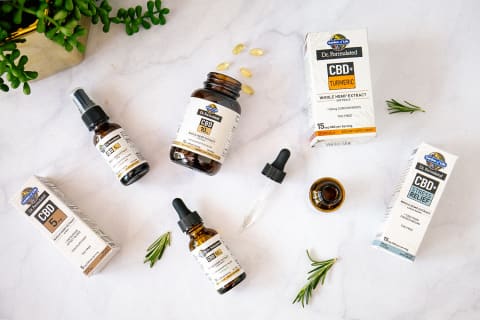Advertisement

If you've ever shopped around for CBD or have been curious about all the hemp hype of late, you might have stumbled upon something called the "entourage effect."
Truth is, it's not just a buzzy-sounding word. And you'll want to pay attention because it might be the one thing that makes all the difference in how you experience the benefits of CBD.
Here's the gist of it: According to the existing research1 so far, CBD's unique balancing properties are believed to be much more powerful when all the different components of the cannabis plant are together, working synergistically. The end result, as the science goes, is greater than what any one of those components can help us achieve alone.
Think of it as a holistic whole-plant approach: Instead of isolating one ingredient or using only one part of the plant, you'll have several components interacting with the systems in your body and each other—for potentially enhanced, wider-reaching results. That's the entourage effect in a nutshell.
Cannabidiol (CBD): The entourage VIP.
So, what are all these cannabis plant components? There are actually a lot of them—we're talking more than 4002 different organic compounds! To name a few of the main players in the entourage, terpenes are the aromatic essential oils found in plants (there are about 200 in cannabis), which have a variety of properties from anti-inflammatory to antibacterial, and flavonoids give plants their color (there are about 20 in cannabis) and have antioxidant properties.
The most important compounds are the cannabinoids: specifically CBD, which usually comes from hemp; and its cousin THC, which usually comes from marijuana. The big difference between the two is that, unlike THC, CBD won't get you high. Bottom line is that cannabinoids are king: They interact with our body by latching on to receptors across our endocannabinoid system3, which helps regulate appetite, sleep, pain, mood, and other processes that enable us to function smoothly from day to day.
Think of it as a holistic whole-plant approach.
As you probably know by now, CBD's nonpsychoactive stress- and pain-relieving benefits have practically made it the new normal in wellness routines these days. But to really shine and do its job to its full potential, CBD needs support from the entourage—terpenes, flavonoids, fatty acids, and other components. Without them, there would be no entourage effect.
And the thing is, not all CBD products will give you that optimal entourage effect. In general, there are three major types of CBD products:
- CBD isolate: A product that's stripped of all the plant matter except the CBD. No entourage effect here.
- Full-spectrum CBD: A product that contains all the natural components in hemp, like terpenes, flavonoids, fatty acids, and other cannabinoids in addition to CBD, including a trace amount (0.3%) of THC that is found in hemp. Entourage effect? Yup.
- Broad-spectrum CBD: A product that contains everything full-spectrum CBD has, minus the THC (which is especially important if you don't want any traces of the psychoactive compound in your body). Entourage effect? Still very much yes.

How to experience it.
If you're interested in experiencing CBD's entourage effect without any trace of THC, start by looking for products labeled "broad-spectrum CBD." Garden of Life's Dr. Formulated line of sustainably grown whole hemp extracts is the very first non-GMO certified softgel CBD, which comes as no surprise since the Certified B-Corp company is renowned for its clean, traceable ingredients.
The products in the Dr. Formulated line—which includes liquid drops that range from 10 to 50 mg of CBD and include specific formulas for wellness goals—contain a full spectrum of cannabinoids, terpenes, flavonoids, and fatty acids found in the hemp plant for a potent entourage effect—with absolutely no THC. (It's worth noting that products can legally be called THC-free with up to 0.3% THC—Garden of Life's products are third-party tested to be truly THC-free.)
And it goes without saying, but purity is incredibly important when it comes to CBD. Always seek out third-party tested and certified brands for CBD products, and check that they're made using a clean extraction process (free from solvents and harsh chemicals). As a bio-accumulator, hemp pulls any and all toxins, like pesticides, for instance, from the soil where it grows and stores it in its plant matter—you get the picture. So, when you're taking CBD oil or softgels, you know it's the cleanest possible CBD—leave the rest to the entourage effect.
